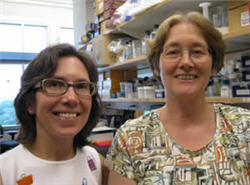Ann Arbor, Mich.- Researchers have identified a gene mutation that causes a rare form of hearing loss known as auditory neuropathy, according to U-M Medical School scientists.
In the study published online today in the Proceedings of the National Academy of Sciences USA, U-M's Marci Lesperance, M.D., and Margit Burmeister, Ph.D. led a team of researchers who examined the DNA of individuals from the same large family afflicted with the disorder.

Marci Lesperance, M.D., left and Margit Burmeister, Ph.D., both U-M Medical School scientists, have identified a gene mutation related to auditory neuropathy.
The researchers identified a mutation in the DIAPH3 gene that causes over-production of a compound known as a diaphanous protein. In previous studies, hearing loss has been linked to a related gene that also affects a diaphanous protein.
Currently, diagnosing auditory neuropathy requires specific testing. Auditory neuropathy may be unrecognized if testing is not performed early in life.
"Since we previously knew of only two genes associated with auditory neuropathy, finding this gene mutation is significant," says Lesperance, professor in U-M's Department of Otolaryngology and chief of the Division of Pediatric Otolaryngology.
"This discovery will be helpful in developing genetic tests in the future, which will be useful not only for this family, but for all patients with auditory neuropathy," Lesperance says.
To investigate the role of these compounds in auditory function, the authors engineered a line of fruit flies that expressed an overactive diaphanous protein in the insects' auditory organ. Using sound to induce measurable voltage changes, Frances Hannan of New York Medical College determined that the flies' hearing was significantly degraded compared to normal flies.
Burmeister says finding the genes causing such rare disorders is very difficult because researchers cannot look at many different families, and instead have to rely on a single family that is often not large enough. But in this study, the researchers used a multi-pronged approach. Rather than relying purely on genetic inheritance information, they combined this information with biological function regarding gene activity.
"The approach we used here of combining genetic inheritance with functional information can be applied to identify the culprit genes in many other rare genetic diseases that have so far been impossible to nail down," says Burmeister, professor of Psychiatry and Human Genetics.
"We can now say we have a tool by combining several genomic approaches to find these genes."
Burmeister, Lesperance and colleagues are actively recruiting research subjects for studies to identify genes involved in genetic hearing loss and also for inherited neurological disorders. Those interested can sign up at www.umengage.org after searching on keywords neurological, deafness or hearing loss.
Additional authors include: Michael Hortsch, associate professor of Cell and Developmental Biology at the University of Michigan;Marc C. Thorne, assistant professor of Otolaryngology;Cynthia J. Schoen, Elzbieta Sliwerska, Jameson Arnett and Sarah B. Emery, all of U-M;and Frances Hannan and Hima R. Ammana of New York Medical College.
Funding: National Institutes of Health, Children's Hearing Foundation of New York.
The University of Michigan Health System includes the U-M Hospitals & Health Centers, which comprises three hospitals and dozens of outpatient health centers and clinics;the U-M Medical School with its Faculty Group Practice and extensive research and education programs;the clinical operations of the U-M School of Nursing;and the Michigan Health Corp. The three U-M hospitals are University Hospital, C.S. Mott Children's Hospital, and Von Voigtlander Women's Hospital. UMHS has been recognized numerous times for excellence in patient care, including 15 years on the honor roll of "America's Best Hospitals", as compiled by U.S. News & World Report. The U-M Medical School is one of the nation's biomedical research powerhouses, with total research funding of more than $420 million, and consistently achieves high rankings for excellence in the education and training of physicians and biomedical scientists. For more on UMHS, see www.med.umich.edu.

